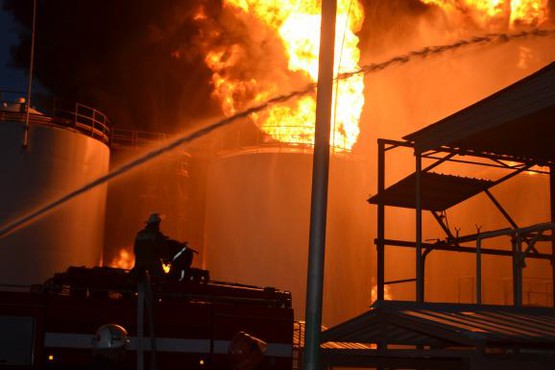
Moscow-Backed Terrorism Likely to Spread Across Ukraine
Publication: Eurasia Daily Monitor Volume: 12 Issue: 107
By:

All eyes are currently on the actions of Moscow-supported units in eastern Ukraine’s Donbas region. Speculations abound as to when and where these forces will attack next and whether the Ukrainian military will be able to hold back or even repulse them. But an even larger threat, albeit one that has so far attracted less attention, is the all too real possibility that Moscow-backed individuals and groups will unleash a wave of terrorist acts across Ukraine—not only to make the task of Ukrainian defenders more difficult, but to discredit Kyiv in the eyes of the Ukrainian population and those of Western countries.
In the last week alone, several terrorist attacks have succeeded (Nr2.ru, June 4). And during the same period, Ukrainian authorities have taken credit for preventing a number of similar Russian-organized terrorist acts (Nr2.com.ua, June 8). Equally useful from Moscow’s perspective, there have been some disasters that many will assume have terrorist roots even if they do not (Nr2.ru, June 9). Accordingly, worries about terrorist acts and other forms of Russian provocation have intensified in Ukraine in recent days, as have speculations about the ways in which Moscow may try to undermine Mikhail Saakashvili in his new position in Odesa (Nr2.com.ua, June 9; see EDM, June 2, 4).
The fact that Moscow sees terrorist acts in Ukraine—regardless of who carries them out—as benefitting Russia is obvious. Any such violence can undermine the confidence of Ukrainians in their government and could almost certainly reduce the willingness of Western governments to help Kyiv—especially if Moscow is not directly involved or could plausibly deny its involvement, as Russia’s “hybrid war” tactics have demonstrated to date.
But the situation in Ukraine is even more dangerous than that reflection might suggest. In an analysis posted on the web portal “The Fourth Power,” Ukrainian analyst Bogdan Butkevich outlines seven reasons why Ukraine is even more likely to face a wave of terrorism in the coming weeks and months than Italy was in the 1970s, when that country was rocked by Red Brigade violence. Butkevich makes his argument by comparing the two situations in detail (Vlada.io, June 3).
First of all, Butkevich says that “the weakness and degradation of the ruling political elite” is far greater in Ukraine than even in Italy in the 1970s. As a result, there is less loyalty to the government and less willingness to put up with problems that publics elsewhere would. Consequently, many more people are prepared to engage in violent actions against the state, and that is something many groups can exploit.
Second, as in Italy but even more so in Ukraine, there is an outside power committed to using violence to weaken the government and discredit it in the eyes of the population and the world. “One can be certain that the Russian special services will support any anti-systemic forces of any direction if their actions will lead to general destabilization,” he notes, even if—or perhaps especially if—these groups are ostensibly anti-Russian (Vlada.io, June 3).
Third, in Ukraine today even more than in Italy 40 years ago, there is “a critical mass of people ready for radical actions,” Butkevich says. Thanks to the fighting in Donbas, there are “tens of thousands of men who are a priori inclined to rapid and decisive action” and the use of violence. Ukrainian civil society has not matured to the point that it will be able to contain all of them, he asserts. Unfortunately, “Ukrainian society has acquired a taste for force, violence and struggle,” a “tectonic” shift in values that will be difficult to reverse anytime soon.
Fourth, like many Italians in the 1970s, many Ukrainians now accept “force as a factor of political life,” as something that they not only have to live with but may themselves make use of.
Fifth, the Ukrainian economy is in shambles in many areas, and there is a growing sense of social injustice among those who have suffered. Moreover, many of them feel that the authorities are doing little or nothing to help those most disadvantaged by reforms. And consequently, such people are quite prepared to “rapidly shift to the use of non-peaceful means,” including terrorism.
Sixth, all these factors, Butkevich continues, hit young people particularly hard because the Ukrainian system lacks the professional lifts that would lead them to focus on their careers and take the longer view that would prevent them from turning to violence. But in Ukraine now, there is a large number of young people, “even with higher educations,” who “cannot find worthy and high-paying jobs” and who blame others for their plight.
And seventh, there is “an enormous quantity of illegal weaponry” in Ukraine, far more than there was in Italy. The amount after a year of war with Russia is truly shocking, and “every day there are crimes taking place with the use of such weapons.” It is not hard to imagine how easy it is for those who use such weapons for ordinary crimes to be talked into using them for the far more horrific crimes of terrorism.
Italy was able to end this plague only with many years of work, and Ukraine faces an even greater task, all the more so because the Russian government has an interest in making sure it does not succeed.




